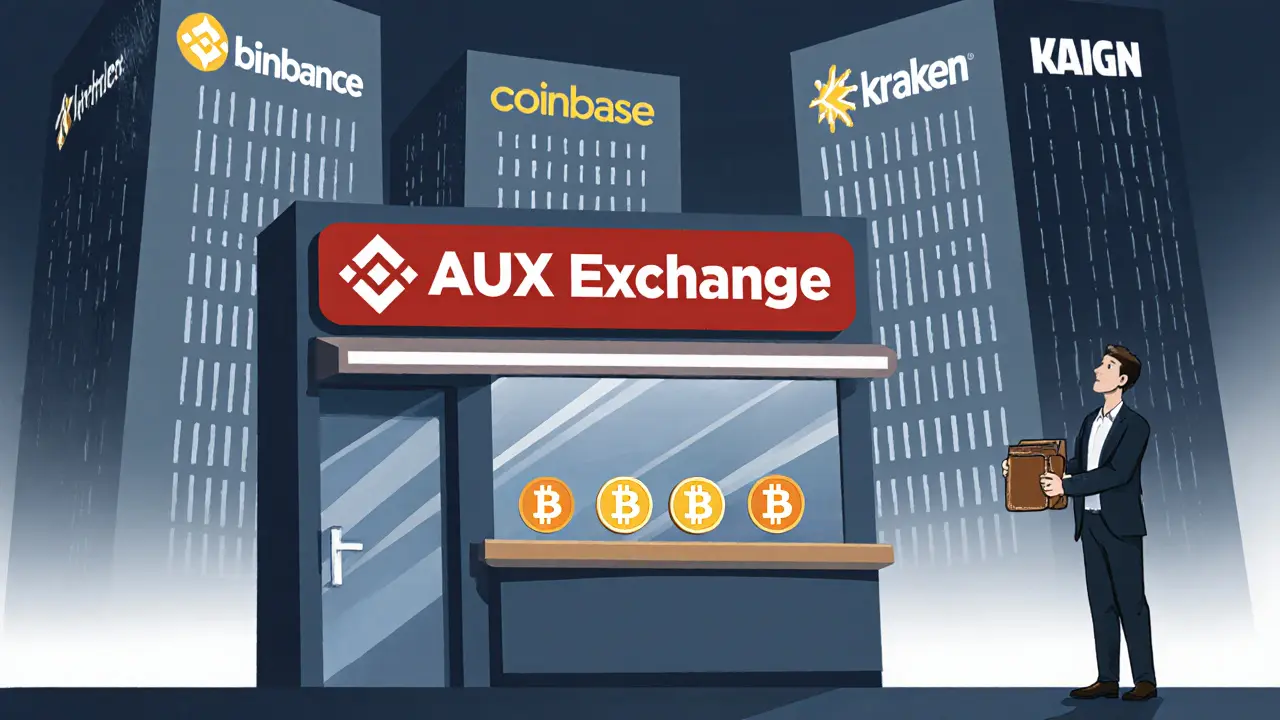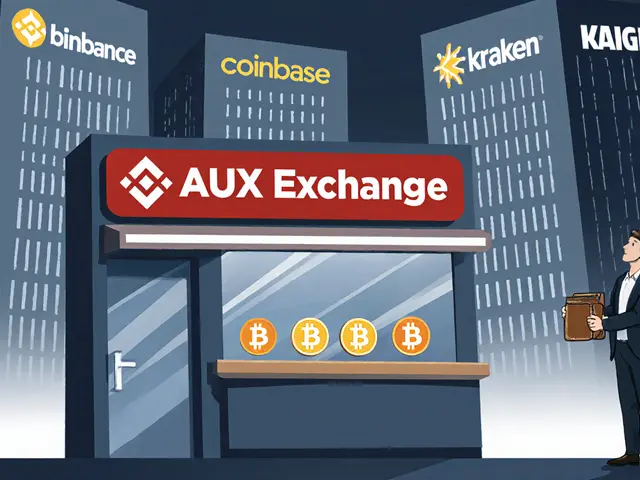AUX Exchange Review: Is This Tiny DEX Worth Your Crypto?

AUX Exchange Risk Assessment Tool
Evaluate AUX Exchange Risks
This tool helps assess potential risks of using AUX Exchange based on key factors. Adjust the sliders to see how different aspects affect overall risk level.
Risk Assessment Result
When you hear the name AUX Exchange is a decentralized cryptocurrency exchange that runs on smart contracts without a central authority, you probably wonder if it can hold its own against the big players. The short answer? It’s a niche platform with just three tokens and three trading pairs, so its usefulness is limited. This AUX Exchange review walks you through everything you need to know before you decide whether to give it a try.
What is AUX Exchange?
AUX Exchange is listed on Coingecko as a decentralized exchange (DEX) but provides almost no public documentation about its launch date, team, or technology stack. Unlike centralized brokers that hold your funds, a DEX lets you trade directly from your wallet, meaning you keep control of private keys. However, the lack of official info makes it hard to verify its legitimacy.
Asset Coverage and Trading Pairs
The platform currently supports only three cryptocurrencies and pairs them in three possible ways. In DEX terms, a trading pair is the combination of two assets you can swap on the exchange. With such a tiny selection, you’re effectively limited to a narrow niche of assets, which dramatically reduces liquidity and the chance of finding good price fills.
Security and Compliance
Security is a top concern for any trader. Because AUX Exchange operates as a DEX, it doesn’t hold user funds in a custodial vault, which eliminates some traditional hacking risks. But that also means there’s no security certifications such as ISO27001, proof‑of‑reserves, or multi‑factor authentication that many reputable exchanges publish. The platform also shows no evidence of regulatory compliance such as AUSTRAC registration in Australia, ASIC licensing, or participation in tax‑reporting programs like the ATO data‑sharing initiative. For users in regulated markets, that gap is a red flag.
Fees and Costs
Unfortunately, there’s no publicly available fee schedule for AUX Exchange. Major exchanges are transparent about maker/taker rates, withdrawal fees, and any hidden costs. The absence of clear fee information makes it difficult to calculate the total cost of a trade, especially when the platform could charge higher gas fees on the underlying blockchain.
User Experience and Support
Beyond the bare‑bones trading interface, there’s virtually no information about onboarding steps, KYC requirements, or customer support channels. The platform lacks a visible help centre, live chat, or phone line. It also doesn’t appear on user‑review sites like Trustpilot, Reddit, or dedicated crypto forums, suggesting a minimal or inactive user base.
How AUX Stacks Up Against Major Exchanges
| Feature | AUX Exchange | Binance | Coinbase | Kraken | Swyftx (AU) |
|---|---|---|---|---|---|
| Asset count | 3 | 5,000+ | 1,000+ | 466 | 500+ |
| Trading pairs | 3 | 12,000+ | 1,500+ | 2,800+ | 500+ |
| Fiat support (AUD) | No | Yes | Yes | Yes | Yes |
| Security certifications | None disclosed | Proof‑of‑Reserves, 2FA | ISO27001, 2FA | Cold storage, 2FA | ISO27001, 2FA |
| Regulatory compliance | Not listed | Multiple licences | US, EU licences | US, EU, AU registration | AUSTRAC, ASIC |
| User reviews | None found | Thousands | Thousands | Thousands | Hundreds of thousands |
Even at a glance, AUX Exchange falls short on every metric that matters to most traders: variety, fiat on‑ramps, security transparency, and community feedback.

Who Might Still Use AUX Exchange?
If you’re a developer looking for a bare‑bones DEX to experiment with smart‑contract integration, the minimal token list could actually be an advantage-fewer variables, easier testing. Similarly, users who only need to swap the three supported assets and prefer a non‑custodial setup might find it acceptable, provided they understand the lack of support and regulatory oversight.
For the average retail investor, however, the platform’s scarcity of assets, unclear fees, and missing compliance make it a risky choice.
Alternative Exchanges to Consider
- Binance - Offers thousands of assets, low fees, and a robust security record.
- Coinbase - Great for beginners, supports AUD deposits, and provides clear regulatory standing.
- Kraken - Known for deep liquidity, advanced order types, and strong security practices.
- Swyftx (Australia) - Tailored for Australian users, integrates tax reporting, and holds ISO27001 certification.
- MEXC - Large asset list, zero‑fee spot trading, and leverages for more aggressive traders.
All of these platforms publish fee schedules, have active support channels, and are listed on reputable data aggregators like Coingecko and CoinMarketCap.
Frequently Asked Questions
Is AUX Exchange safe to use?
Safety is hard to verify because the platform provides no security certifications, audit reports, or regulatory registration. As a DEX, you keep control of your private keys, which reduces custodial risk, but you also lose the safety nets offered by regulated exchanges.
What cryptocurrencies can I trade on AUX Exchange?
Only three tokens are listed on the platform, forming three possible trading pairs. The exact names are not widely documented, so you’ll need to check the exchange’s UI for the current list.
Are there any fees on AUX Exchange?
The exchange does not publish a fee schedule. Traders may incur network (gas) fees from the underlying blockchain, but the exact maker/taker rates are unknown.
Can I deposit AUD directly into AUX Exchange?
No. AUX Exchange currently does not support fiat on‑ramps, including Australian dollars, so you must first acquire the supported cryptocurrencies on another platform.
How does AUX Exchange compare to Swyftx for Australian users?
Swyftx offers over 500 assets, direct AUD deposits, ISO27001 certification, and integrated tax reporting-features that AUX Exchange completely lacks. For most Australian traders, Swyftx is a far more practical choice.



Brandon Salemi
Wow, AUX Exchange definitely has a sleek UI, but the limited asset support feels a bit cramped. The risk tool is kind of handy for quick checks. I wish they added more layers of security certification though. Overall, it’s a decent starter DEX for newcomers.
Hanna Regehr
The interface looks polished, and the fee transparency section gives a clear picture of costs. From a usability standpoint, the sliders make risk assessment feel interactive, which is a nice touch. However, the lack of regulatory compliance info is concerning for long‑term investors. I appreciate the balanced tone of the write‑up, it feels neither overly hype nor dismissive.
Ben Parker
Looks slick 😎
Daron Stenvold
In terms of security, the platform’s dramatic flair is evident, yet the actual certifications are minimal. A formal audit report would elevate confidence dramatically. The risk indicator’s color coding is helpful, though the high‑risk warning could be more prominent. I’m impressed by the design, but I’d advise caution before moving large sums.
hrishchika Kumar
From a cultural standpoint, AUX feels like a fresh breeze in the crypto garden-vibrant colors and a user‑friendly vibe. Yet the scarcity of user reviews makes it feel like an untold story. Think of it as a budding artist: promising, but still polishing the canvas. The risk tool could use a splash of community feedback to truly shine.
Nina Hall
Optimistic vibes! The DEX’s compact nature makes onboarding smooth, especially for newcomers. I love that the fee transparency is upfront-no hidden surprises. Still, the limited fiat support could be a hurdle for those wanting to bridge real money. Overall, a bright start for a tiny exchange.
Anjali Govind
Curious about how the risk weighting was decided-assets get a base score, while certifications get double weight. That structure makes sense for a safety‑first mindset. Still, the tool feels a bit static; adding real‑time market volatility could improve its relevance.
Sanjay Lago
Yo, this DEX looks kinda dope but they really need more crypto pairs!! Also, the risk sliders are kinda basic, but at least they're there. Gotta say, the fee stuff is pretty clear tho. Maybe add some promos for early birds?
Ted Lucas
The platform’s architecture appears modular, leveraging smart‑contract isolation to mitigate cross‑protocol attacks. Their fee schema, however, lacks tiered incentives for high‑volume traders-a missed opportunity for liquidity growth. The risk assessment interface employs a simplistic linear weighting, which could be refined with probabilistic modeling. Overall, the product shows promise but needs deeper technical depth.
Manas Patil
From a cultural lens, AUX is trying to blend global asset coverage with localized fiat bridges, yet the execution feels like a half‑baked pilot. Their jargon‑heavy documentation might alienate newcomers, but the underlying tech stack appears robust. If they expand regulatory dialogues, the platform could gain serious traction across jurisdictions.
Annie McCullough
Honestly, this DEX seems overrated and the risk tool is just a gimmick it doesn't tell you much
Carol Fisher
🇺🇸 American traders deserve a platform that puts patriotism first-AUX is not it. They need stricter compliance, not this vague “risk” slider. If you care about your assets, stay away.
Melanie Birt
From an expert standpoint, the absence of third‑party audits is a red flag. Yet the UI is intuitive, which can help onboarding. I’d recommend the team publish a security whitepaper soon. 🚀
Lady Celeste
Not impressed. Looks basic.
Ethan Chambers
Well, if you’re looking for a DEX that pretends to be revolutionary while offering nothing new, AUX might just fit the bill. Their risk sliders are as pretentious as a self‑appointed guru without credentials. The whole thing feels like a staged performance rather than genuine innovation.
Scott Hall
Cool overview, but I think we should discuss real‑world use cases. Many folks just need a quick swap without diving into risk metrics.
Jade Hibbert
Oh great, another “tiny” DEX that probably can’t handle more than a few trades a day. Sure, it’s “tiny,” but that’s the point, right?
Leynda Jeane Erwin
Look, the interface is decent but the writing swings between formal report and casual chat. Consistency would help users trust the data.
Siddharth Murugesan
Honestly this looks like a scam, no real security certs, no real reviews, just a fancy risk slider that fools people.
Lena Vega
Short and sweet: needs more assets.
Mureil Stueber
The risk assessment tool is functional but could benefit from clearer labeling; overall, the platform is competent.
Emily Kondrk
Ever wondered why every new DEX seems to hide behind “risk sliders” while the real agenda is data harvesting? AUX might be another cog in the surveillance machine, disguised as a user‑friendly portal. Their lack of transparent governance raises eyebrows. Still, the colorful UI could lure unsuspecting traders into complacency. It’s a classic bait‑and‑switch scenario, wrapped in crypto hype.